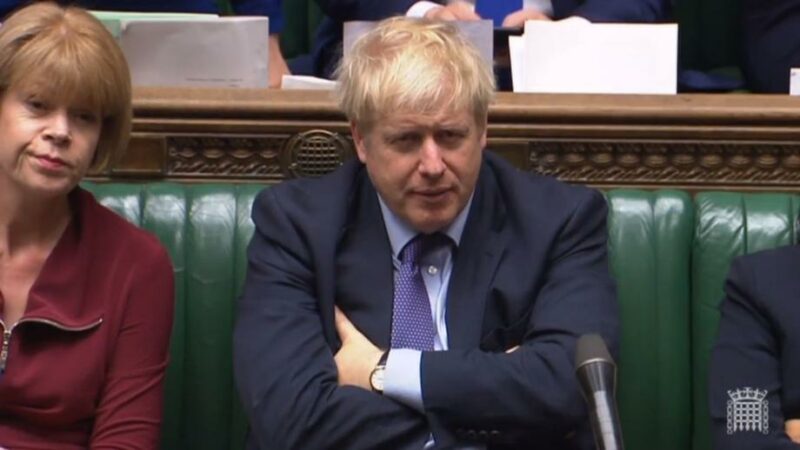'I’ve seen how policy is developed at the highest levels of government, but also how it plays out in the day-to-day lives of people at the margins of our society. Decisions made in the abstract at the top have painfully real consequences at the bottom.'

Tom is a freelance writer and policy expert on mental health and social security. He also works as a Mental Health Social Worker in the NHS
At last week’s Prime Minister’s Questions, responding to Labour MP Kim Leadbeater, Boris Johnson denied that the upcoming cut to Universal Credit would have a negative impact on people’s mental health.
Having spent 18 months on secondment at the Department for Work and Pensions advising on mental health, and now working in frontline NHS mental health services as a Social Worker, I have no doubt at all that the mental health fallout from the cut will be huge.
I’ve seen how policy is developed at the highest levels of government, but also how it plays out in the day-to-day lives of people at the margins of our society. Decisions made in the abstract at the top have painfully real consequences at the bottom.
Perhaps the scale of impact that is being warned of leads some people, including the Prime Minister, to assume the case is being overstated. The latest estimates suggest that over 800,000 people could be pulled into poverty by the cut.
Over recent decades, there has been a lack of meaningful debate about how much people supported by benefits actually need to get by, let alone to live healthily. During this same period, unemployment benefit rates have been squeezed through a lack of uprating – prior to the pandemic they were at their lowest in real terms since the early 90s.
The pernicious narrative that increases in benefit would discourage work allowed levels of support to atrophy with little focus on how this was impacting on people’s lives. But ending the £20 uplift to Universal Credit is a conscious decision to return to inadequate pre-pandemic rates, despite the post-pandemic reality of higher fuel and food prices.
At a population level, public health evidence is clear that poverty and inequality contribute to poor physical and mental health. If the warnings about the impact of the cut on rates of poverty are anywhere near accurate, it is difficult to see how the consequences will be anything less than disastrous in terms of the aggregate mental health of those affected.
But how does this play out at an individual level? What’s the path that takes someone from experiencing a drop in their income to experiencing mental health problems?
There is a well-evidenced, mutually reinforcing relationship between financial difficulties and mental health problems. Knowing the cut is coming will mean that people who are reliant on this support will already be worrying about how they will make ends meet on a tighter budget. These concerns will be even more acute for anyone with caring responsibilities.
If you are worrying and feeling insecure and under threat much of the time, well, that’s anxiety. Extended periods of anxiety, compounded by difficult life circumstances, can lead to people feeling depressed and struggling to manage day-to-day tasks. If people feel trapped and powerless in their situation, they may well experience suicidal thoughts.
For many people on Universal Credit, their mental health is the reason they are out-of-work in the first place. Over 600,000 people on the benefit are exempt from DWP requirements to seek work because of the impact of disability or illness. For around half of this group, that is primarily because of mental health problems, while many others will be struggling with their mental health alongside other disabilities or illnesses.
The Government’s suggestion that people can just make up the cut by working an extra two hours was not only untrue but also conveniently ignored those whose health or disability makes it hard for them to work at all. Almost two million more ill and disabled people were similarly ignored when the £20 uplift was not applied to ‘legacy’ benefits such as Employment and Support Allowance (ESA).
For many of the people I support as a Mental Health Social Worker, financial difficulties and the fear of losing their benefits are an ever-present source of anxiety and uncertainty that exacerbates other aspects of their poor mental health. When people do experience a loss of income due to problems with their benefits, it can send them spiralling into a crisis.
The knock-on costs of the Universal Credit cut will be huge, as mental health services, local authorities, foodbanks and other third sector organisations have to respond to the fallout in people’s lives. The fact that the cut is seen as a £6bn ‘saving’ in Westminster demonstrates the disconnect between policy decisions and their real-life consequences.
Although mental health has shot up the political agenda over the last decade, there has been resistance, particularly from the Conservatives, to acknowledging the connections to wider economic and social policy. But unless this Government changes course on the Universal Credit cut, the impact of its actions on people’s mental health will soon be painfully clear.
To reach hundreds of thousands of new readers we need to grow our donor base substantially.
That's why in 2024, we are seeking to generate 150 additional regular donors to support Left Foot Forward's work.
We still need another 117 people to donate to hit the target. You can help. Donate today.



